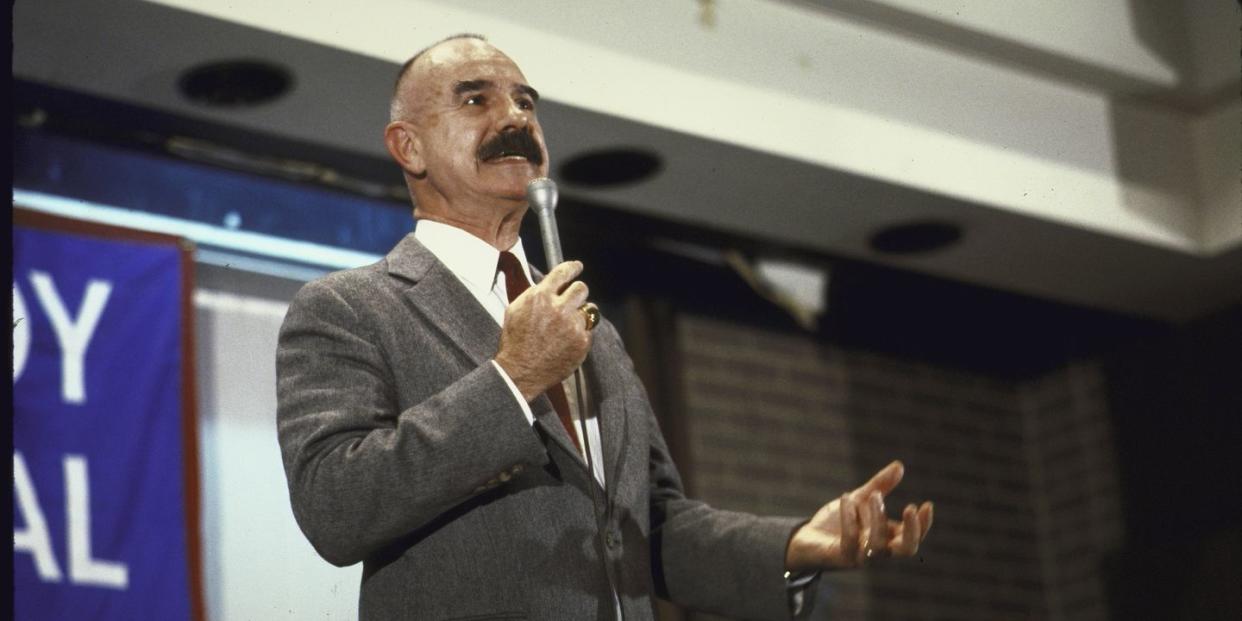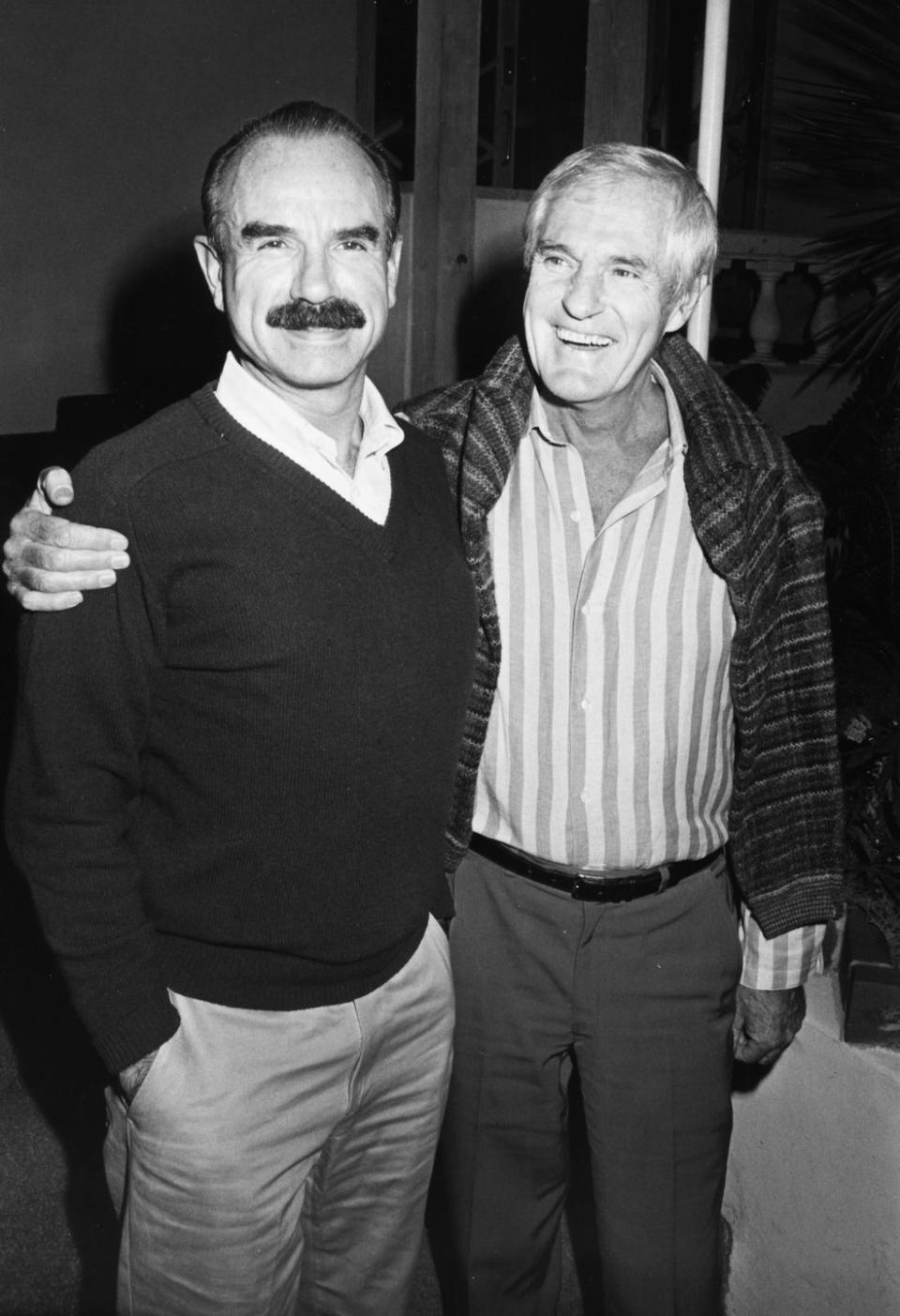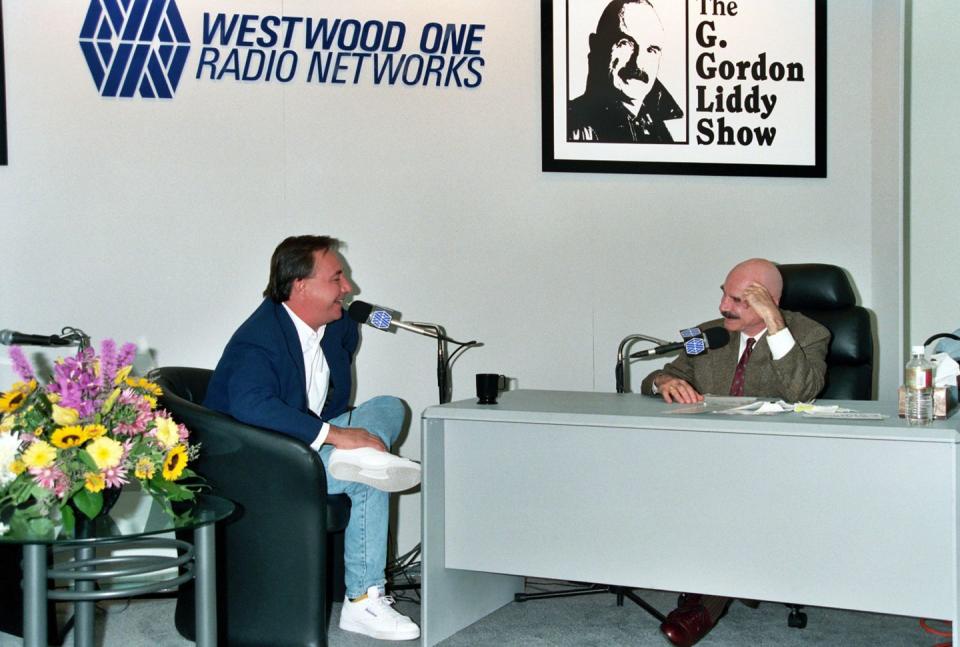Here’s What Happened to G. Gordon Liddy After the Watergate Scandal

- Oops!Something went wrong.Please try again later.
- Oops!Something went wrong.Please try again later.
- Oops!Something went wrong.Please try again later.
"Hearst Magazines and Yahoo may earn commission or revenue on some items through these links."
G. Gordon Liddy served 52 months in prison for his role in organizing the break-ins at the center of the Watergate scandal in May and June 1972. But instead of dooming the former FBI agent turned political operative to obscurity, the misconduct only seemed to boost Liddy’s star power in the decades that followed.
Liddy’s notorious plot to spy on the Democratic National Committee, which led to President Richard Nixon’s resignation in August 1974, is satirically featured in the new HBO limited series White House Plumbers. Justin Theroux stars as Liddy, and Woody Harrelson plays his co-conspirator E. Howard Hunt. The real life Liddy and Hunt were part of a special White House unit, informally known as the Plumbers, whose job was to prevent or respond to leaks of classified information.
Surprisingly, upon his release from prison in 1977, Liddy embarked on a long and successful career as an author, public speaker, radio personality, and television actor up until his death on March 30, 2021. The spotlight seemed fitting for the eccentric and controversial Liddy, who claimed he once ate a rat and could feel an “electric surge” through his body while listening to broadcasts of Adolf Hitler.
Here’s what happened to G. Gordon Liddy post-Watergate scandal, including some of his wild endeavors.
After Prison, Liddy’s Life as an Author
According to The Washington Post, Liddy was sentenced in March 1973 to 20 years in federal prison for conspiracy, burglary, and illegal wire-tapping related to Watergate. President Jimmy Carter commuted Liddy’s sentence to only eight years in April 1977, making him eligible for parole. He was freed soon after on September 7.
Liddy, who was born in Brooklyn on November 30, 1930, and grew up in Hoboken, New Jersey, exhibited quirkiness from a young age and wasn’t shy about showing it off. In a 1980 interview with NPR, he shared the story of how he overcame his childhood fear of rats by roasting and eating one his sister’s cat had killed.
According to the Los Angeles Times, he also claimed he put himself through tests to strengthen his will, like jumping out of the way of oncoming trains at the last minute and climbing a tree during an electrical storm to see if he would be struck.
He shared these and other candid anecdotes in one of his first major projects out of prison, a 1980 autobiography titled Will that sold more than one million copies and was adapted into a 1982 made-for-TV movie starring Robert Conrad. According to his Washington Post obituary, Liddy wrote that he enjoyed antagonizing wardens and incarcerated gang members while in prison. He even sang a Nazi anthem in response to racial epithets from Black prisoners. “I don’t believe there was a man there who understood one word of what I sang. But they got the message,” Liddy said.
Liddy also published two novels, the 1979 espionage thriller Out of Control and 1990’s The Monkey Handlers, as well as the nonfiction political commentaries When I Was a Kid, This Was a Free Country in 2003 and Fight Back: Tackling Terrorism, Liddy Style in 2006.
Public Speaking Debates with Timothy Leary

Liddy visited colleges for public speaking engagements throughout the 1980s and participated in staged political debates with Timothy Leary, the psychologist and professor who famously advocated for the use of psychedelic drugs like LSD.
The two first crossed paths in 1966, when Liddy orchestrated a drug raid as an assistant district attorney in Poughkeepsie, New York, that led to Leary’s arrest. Leary, who Nixon had dubbed the “most dangerous man in America,” was later arrested again on marijuana possession charges and imprisoned in the 1970s.
The debates, which featured creative taglines such as “Nice Scary Guy Versus Scary Nice Guy” and “The State of the Mind Versus The Mind of the State,” pitted conservative Liddy against his progressive foil Leary in discussions about national security and civil liberties.
“He’s Darth Vader to my Luke Skywalker,” Leary once said of Liddy, according to The Washington Post. Their debates were featured in the 1983 documentary film Return Engagement.
Liddy’s Radio Show

Liddy’s most notable—and controversial—venture was his radio talk show The G. Gordon Liddy Show, which was carried by more than 270 stations across the country and reached an estimated 10 million listeners, according to The Washington Post.
Started in 1992, the show featured the “G Man” alternating between daily news and radical outbursts. Liddy often insulted President Bill Clinton, calling him the “coward-in-chief,” and bragged to listeners he used photos of Bill and wife Hillary Clinton for target practice.
He also drew controversy by linking the Bureau of Alcohol, Tobacco, and Firearms to the Oklahoma City bombing carried out by Timothy McVeigh in 1995. He partially blamed the attack on ATF’s raid on the Branch Davidian compound in Waco, Texas, two years prior.
Liddy morbidly advised viewers to shoot ATF agents in the head, though he later claimed he meant only in self-defense. “You can die under their bullets, or you can shoot back and try to defend your wife and family,” he said. “If they’re wearing flak jackets, don’t shoot them there, shoot them in the head.”
Liddy’s show remained on the air until his retirement in July 27, 2012.
Liddy in Movies and TV

Actor John Diehl portrayed Liddy in the 1995 Oliver Stone film Nixon. But Liddy wasn’t afraid to be in front of the camera, either.
He had 20 acting credits according to IMDb and often played nefarious television characters, such as Captain William Maynard on Miami Vice in 1985 and 1986 and Carl Strickland in a 1988 episode of MacGyver. “I played only villains, and that way, as [my wife Frances] says, I don’t have to act. I just go there and play myself,” he told Playboy in 1995.
Liddy acted in 46 episodes of 18 Wheels of Justice from 2000 to 2001 and also had guest roles in the TV shows Airwolf, The Highwayman, and an adaptation of the Encyclopedia Brown book series.
But perhaps Liddy’s wildest TV appearance was his turn as a contestant on a celebrity edition of Fear Factor, the stunt-based NBC game show hosted by Joe Rogan in its first run from 2001 to 2006. Liddy, the show’s oldest-ever contestant at age 75, competed with seven other celebrities in an episode that aired September 12, 2006.
Liddy and former child actor Tempestt Bledsoe won the first stunt, which had them removing flags from a safety vest while being violently dunked in a pool of water. Then after Bledsoe quit, he lasted the longest inside an isolation pod that subjected contestants to high temperatures, bugs, and other surprises to win a pair of Metropolitan Chopper motorcycles.
Liddy’s last TV and film credit was in 2009. After his death in 2021 at age 90, his son Thomas revealed Liddy had been diagnosed with Parkinson’s disease a few years prior. He was survived by five children and 12 grandchildren.
How to Watch White House Plumbers
The first episode of White House Plumbers premieres Monday, May 1 at 9 p.m. ET/PT on HBO, with four additional episodes airing weekly on Monday nights. The series will also stream on HBO Max.

